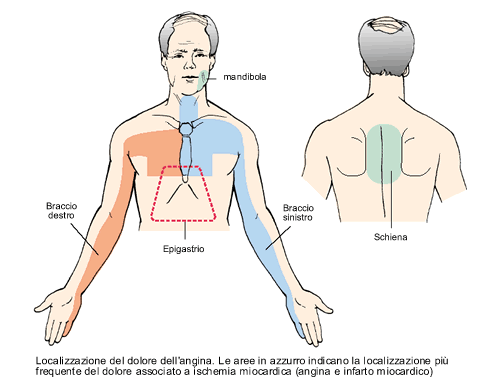Assalammualaikum and hello there...
First and foremost i'm not feeling well or i'm sick due to people's attitude around me muscle cramp on my chest aka kak gina pregnancy. I know some think that i’m lying about my disease but i’m not. I just dont like to ‘brag’ about it ok! Please people, understand a little bit..
 angina pectoris???
angina pectoris???
What is angina pectoris, doctor?
Angina pectoris is a term that describes chest pain caused by myocardial ischemia - a condition in which the amount of oxygen getting to the heart muscle is insufficient. It usually occurs on exertion and is relieved by rest. Angina generally is a symptom ofcoronary artery disease. In most severe cases, it may occur with minimal effort or at rest.
How does it feels, doctor?
Angina pectoris is a common manifestation of coronary artery disease. The pain is caused by reduced blood flow to a segment of heart muscle (myocardial ischemia). It usually lasts for only a few minutes, and an attack is usually quickly relieved by rest or drugs (such as nitroglycerin). Also, it is possible to have myocardial ischemia without experiencing angina.
Typically, angina is described as a "pressure" or "squeezing" pain that starts in the center of the chest and may spread to the shoulders or arms (most often on the left side, although either or both sides may be involved), the neck, jaw or back. It is usually triggered by extra demand on the heart: exercise, an emotional upset, exposure to cold, digesting a heavy meal are common examples.
Some people experience angina while sleeping or at rest. This type of angina may be caused by a spasm in a coronary artery, which most commonly occurs at the site of atherosclerotic plaque in a diseased vessel.
Most people with angina learn to adjust their lives to minimize attacks. There are cases, however, when the attacks come frequently and without provocation - a condition known as unstable angina. This is often a prelude to a heart attack and requires special treatment, primarily with drugs. Angina affects both men and women, usually in middle age. Men are much more likely than women to experience it before age 60. It may develop weeks, months or even years before a heart attack, or may be experienced only after a heart attack has occurred.
What are the causes, doctor?
The two main causes of angina are coronary artery spasm, and atherosclerotic plaque buildup which causes critical blockage of the coronary artery.
The risk factors include:
· smoking
· sedentary lifestyle
· high blood pressure, or hypertension
· high blood fats or cholesterol
· hypercholesterolemia
· diabetes
· family history of premature ischemic heart disease
Men are at higher risk than women.
What are the symptoms, doctor?
Classic or typical angina occurs predictably with physical exertion or strong emotional reactions, and goes away just as predictably with rest. Starting immediately behind the sternum (breast bone), the pain may radiate to the left arm and shoulder or up to the jaw.
Most people describe the pain as a kind of squeezing pressure, tightness or heaviness.
There may be anxiety, increased or irregular heart rate, paleness and cold sweat, and a feeling of doom. The symptoms are like the ones for a heart attack.
In some instances, chest pain results from other types of heart problems, including diseases that affect the heart muscle itself or the valves that control blood flow through the heart. Occasionally, ulcers, gallstones, abnormal contractions of the esophagus or severe anxiety and panic attacks can cause chest pain. However, if you do experience these symptoms, your best plan of action is to get immediate help. Stop doing whatever is causing the symptoms and call 911. Lie down with your head slightly elevated. If you are not allergic to it, take one adult aspirin.
What is the treatment?
In most instances, drugs are recommended for the treatment of angina before surgery is considered. The major classes of drugs used to treat angina include the following:
Nitrates. These come in several forms: nitroglycerine tablets to be slipped under the tongue during or in anticipation of an attack; ointment to be absorbed through the skin; long-acting medicated skin discs; or long-acting tablets. The latter three forms are used mostly to prevent rather than relieve attacks. The nitrates work by reducing the oxygen requirements of the heart muscle.
Beta-blocking Drugs. These agents act by blocking the effect of the sympathetic nervous system on the heart, slowing heart rate, decreasing blood pressure, and thereby, reducing the oxygen demand of the heart. Recent studies have found that these drugs also can reduce the chances of dying or suffering a recurrent heart attack if they are started shortly after suffering a heart attack and continued for two years.
Calcium-channel Blocking Drugs. These drugs are prescribed to treat angina that is thought to be caused by coronary artery spasm. They can also be effective for stable angina associated with exercise. All muscles need varying amounts of calcium in order to contract. By reducing the amount of calcium that enters the muscle cells in the coronary artery walls, the spasms can be prevented. Some calcium-channel blocking drugs also decrease the workload of the heart and some lower the heart rate as well.

All info from: Doctor aQilah... waaa.... perasan!!
For more info- http://www.healthscout.com/ency/68/127/main.html








2 kte2 hikmat..:
babe.take care k? <3
dear, we all worry about you..
take pretty good care of your health k?
miss ya dear...
Post a Comment